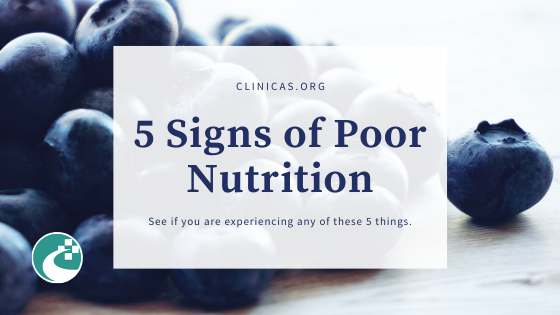
Created by the Academy of Nutrition and Dietetics, National Nutrition Month in March is meant to encourage healthier eating habits for a healthier life. In California, 24.2 percent of adults are obese and a third of young adults could be prediabetic. Fortunately, Ventura County has one of the lowest food insecurity rates in the state, which means access to healthy foods should be easy, but many adults do still struggle to eat nutritiously. From what you see in the mirror to what you feel in your gut, there are numerous ways the body tries to silently let us know that something's up and it's not getting what it needs. Check out these sometimes sneaky signs of poor nutrition.
1. Brain Lag
Memory issues, delayed cognition, and poor concentration are all signs the brain is not being fed the nutrients it needs to keep those synapses firing. Our brains rely on us to give it the proper nutrients to function well. One such nutrient is omega-3 fatty acids. These particular fatty acids have been shown in research to facilitate brain cell communication, and low levels of omega-3s have actually been associated with accelerated aging of the brain.
2. Slow Healing
If you are slow to heal when you cut your finger or develop a wound, it could be a sign of poor nutritional intake. Vitamins are important to healing, and protein is essential to encouraging collagen formation during healing processes. Nutrition support is actually something proven as effective when used to encourage severe wound healing for patients who are in intensive care.
3. Fatigue
Overall, poor nutrition obviously has a detrimental effect on the body. Something as simple as not eating good, wholesome food can even mean you have a lower quality of life because you just don't feel good. If you struggle with proper nutritive intake, schedule a visit with your doctor in Ventura County, CA to talk candidly about things you may need to change. There's no better way to pay homage to National Nutrition Month than that.
That tired, sluggish feeling that follows you from the bed in the morning all the way to the bed at night isn't normal. Yes, some people are overworked and overstressed, but fatigue to an excessive degree can also be your body letting you know it needs something more. Many vitamin deficiencies are suspected to cause fatigue, such as vitamin B-1 (Thiamine) and vitamin C. Vitamin B-1 actually helps convert food to energy, so if you're not getting enough, it can make you feel tired and sluggish. Vitamin C has been proven to lower fatigue scores in research efforts as well.
4. Prematurely Aging Skin
Did you know what you eat (or don't eat) can make you look older? In 2012, a study was done that showed vitamin-rich diets filled with flavonoids and valuable antioxidants had major benefits for the skin. Get in those fruits and veggies daily and you may see a more youthful glow.
5. Poor Hair Health
Most people know that their organs can suffer from poor nutritional intake, but there is one series of tiny organs that get overlooked a lot: hair follicles. As such, when you don't eat good food, hair follicles can suffer the effects, which has a direct impact on the health of your hair. Studies have shown that nutritional deficiency can impact how the hair grows and the health of its overall structure. Further, hair loss is a common problem associated with things like iron or protein deficiency.
Is Poor Nutrition Consuming Your Ability to Feel Well?
Overall, poor nutrition obviously has a detrimental effect on the body. Something as simple as not eating good, wholesome food can even mean you have a lower quality of life because you just don't feel good. If you struggle with proper nutritive intake, schedule a visit with your doctor in Ventura County, CA to talk candidly about things you may need to change. There's no better way to pay homage to National Nutrition Month than that.
Meta Title
National Nutrition Month | 5 Signs of Poor Nutrition
Meta Description
Head, shoulders, knees, and toes-the body signals poor nutrition everywhere! Find out the signs of poor nutrition you may be missing for National Nutrition Month.
Sources:
http://www.cafoodbanks.org/hunger-factsheet
https://www.ventura.org/human-services-agency/food-data/
https://www.healthline.com/health/vitamin-watch-b1-thiamine#supplements
https://www.ncbi.nlm.nih.gov/pmc/articles/PMC4404917/
https://www.ncbi.nlm.nih.gov/pmc/articles/PMC3583891/
https://www.ncbi.nlm.nih.gov/pmc/articles/PMC5315033/

